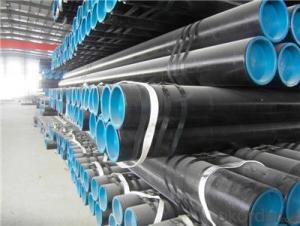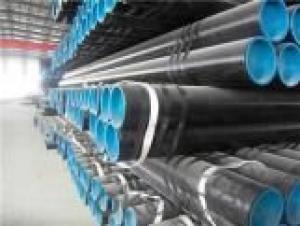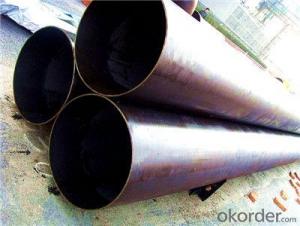Steel Pipe SCH40/80/STD With High Quality and Best Price
- Loading Port:
- Tianjin
- Payment Terms:
- TT or LC
- Min Order Qty:
- 100 m.t.
- Supply Capability:
- 1000 m.t./month
OKorder Service Pledge
OKorder Financial Service
You Might Also Like
1、Structure of Seamless Pipe SCH40/80/STD:
Seamless pipe is formed by drawing a solid billet over a piercing rod to create the hollow shell. As the manufacturing process does not include any welding, seamless pipes are perceived to be stronger and more reliable. Historically seamless pipe was regarded as withstanding pressure better than other types, and was often more easily available than welded pipe.
2、Main Features of theSeamless Pipe SCH40/80/STD:
• High manufacturing accuracy
• High strength
• Small inertia resistance
• Strong heat dissipation ability
• Good visual effect
• Reasonable price
3、Seamless Pipe SCH40/80/STD Specification:
Standard | GB, DIN, ASTM ASTM A106-2006, ASTM A53-2007 |
Grade | 10#-45#, 16Mn 10#, 20#, 45#, 16Mn |
Thickness | 8 - 33 mm |
Section Shape | Round |
Outer Diameter | 133 - 219 mm |
Place of Origin | Shandong, China (Mainland) |
Secondary Or Not | Non-secondary |
Application | Hydraulic Pipe |
Technique | Cold Drawn |
Certification | API |
Surface Treatment | factory state or painted black |
Special Pipe | API Pipe |
Alloy Or Not | Non-alloy |
Length | 5-12M |
Outer Diameter | 21.3-610mm |
Grade | 20#, 45#, Q345, API J55, API K55, API L80, API N80, API P110, A53B |
Standard | ASME, ASTM |
1) Material:20#(ASTM A 106/A53 GRB.API5LGRB,GB),45#,16Mn,10#.
2) Specification range:OD:21.3-610mm,WT:6-70mm,length:6-12m or according to the requirement of clients.
3) Excutive standards:GB,ASME API5L.ASTM A 106/A53,Despite of the above standards,we can also supply seamless steel pipe with standard of DIN,JIS,and so on,and also develop new products according to the requirements of our clients!
4) Surface:black lacquered,varnish coating or galvanized.
5) Ends:Beveled or square cut,plastic capped,painted.
6) Packing:bundles wrapped with strong steel strip,seaworthy packing.
4、Packaging & Delivery
Packaging Details: | seaworthy package,bundles wrapped with strong steel strip |
Delivery Detail: | 15-30days after received 30%TT |
5、FAQ of Seamless Pipe SCH40/80/STD:
①How is the quality of your products?
Our products are manufactured strictly according to national and internaional standard, and we take a test
on every pipe before delivered out. If you want see our quality certifications and all kinds of testing report, please just ask us for it.
Guaranteed: If products’ quality don’t accord to discription as we give or the promise before you place order, we promise 100% refund.
②How about price?
Yes, we are factory and be able to give you lowest price below market one, and we have a policy that “ for saving time and absolutely honest business attitude, we quote as lowest as possible for any customer, and discount can be given according to quantity”,if you like bargain and factory price is not low enough as you think, just don’t waste your time.Please trust the quotation we would give you, it is professional one.
③Why should you chose us?
Chose happens because of quality, then price, We can give you both.Additionally, we can also offer professional products inquiry, products knowledge train(for agents), smooth goods delivery, exellent customer solution proposals.Our service formula: good quality+good price+good service=customer’s trust
SGS test is available, customer inspection before shipping is welcome, third party inspection is no problem.
Any question, pls feel free to contact us !
6、Seamless Pipe SCH40/80/STD Images:
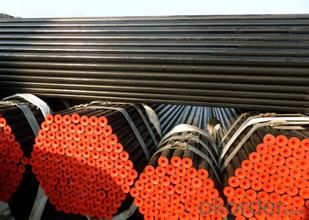
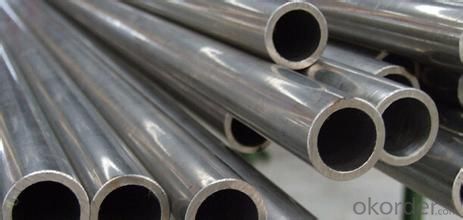
- Q:How are steel pipes used in stadium construction?
- Steel pipes are commonly used in stadium construction for various purposes such as structural support, roofing, and plumbing systems. They provide strength and durability to the overall structure of the stadium, allowing it to withstand heavy loads and adverse weather conditions. Steel pipes are also used for the installation of HVAC systems, water supply lines, and drainage systems within the stadium.
- Q:Can steel pipes be used for conveying abrasive materials?
- Yes, steel pipes can be used for conveying abrasive materials. Steel pipes are known for their durability and resistance to wear, making them suitable for handling abrasive materials. Additionally, steel pipes can be lined with various protective coatings or linings to further enhance their resistance to abrasion and extend their lifespan.
- Q:How are steel pipes used in the manufacturing of food and beverage processing plants?
- Steel pipes are commonly used in the manufacturing of food and beverage processing plants due to their durability, cleanliness, and resistance to corrosion. These pipes are utilized for various purposes such as transporting liquids, gases, and ingredients within the plant. They are also essential for the distribution of water, steam, and other fluids required in the production and cleaning processes. Additionally, steel pipes are used for the installation of equipment, such as pumps and valves, ensuring a safe and efficient operation of the plant.
- Q:How many fasteners are there in a ton of steel tubes?
- The fastener generally refers to the intermediate connecting parts connecting two members, in the construction project for external diameter of steel pipe scaffold with 48mm fixation, the fastener is divided into rectangular fastener (cross directional fastener fastener) rotary fastener (universal movable fastener fastener) (a direct docking fastener fastener fastener) etc..
- Q:Can steel pipes be used in extreme weather conditions?
- Yes, steel pipes can be used in extreme weather conditions. Steel is a durable and strong material that can withstand various weather conditions, including extreme temperatures, high humidity, and severe storms. Additionally, steel pipes can be coated or treated to provide additional resistance against corrosion, making them suitable for use in harsh environments.
- Q:How are steel pipes used in the agriculture industry?
- Steel pipes are used in the agriculture industry for various purposes such as irrigation systems, drainage systems, and livestock handling equipment. They provide a durable and reliable solution for transporting water, nutrients, and effluents, ensuring efficient and effective operations in farm settings.
- Q:How do steel pipes handle seismic expansion joints?
- Steel pipes handle seismic expansion joints by incorporating flexible joints or bellows in the pipeline system. These flexible joints are designed to absorb and accommodate the movement caused by seismic activity, allowing the steel pipes to expand and contract without causing damage or failure to the overall pipeline system.
- Q:What are the common uses of stainless steel pipes?
- Stainless steel pipes are widely used in various industries for a multitude of applications. Some of the common uses of stainless steel pipes include: 1. Plumbing and Water Supply: Stainless steel pipes are often used in residential, commercial, and industrial plumbing systems due to their corrosion resistance, durability, and ability to handle high-pressure applications. They are also used in water treatment plants and wastewater management systems. 2. Oil and Gas Industry: Stainless steel pipes are extensively used in the oil and gas industry for transporting oil, gas, and other fluids. They can withstand high temperatures, pressure, and corrosive environments, making them ideal for this industry. 3. Food and Beverage Industry: Stainless steel pipes are widely used in the food and beverage industry due to their hygienic properties and resistance to corrosion. They are commonly used for transporting liquids, gases, and food products in processing plants, breweries, wineries, dairies, and other food-related facilities. 4. Chemical and Petrochemical Industry: Stainless steel pipes are critical in the chemical and petrochemical industry, where they are used for transporting corrosive chemicals, acids, and other hazardous substances. The pipes' resistance to corrosion and high temperatures makes them suitable for these demanding applications. 5. Construction and Architecture: Stainless steel pipes are used in construction and architecture for various purposes such as structural support, handrails, guardrails, and decorative elements. Their strength, durability, and aesthetic appeal make them a popular choice in modern architectural designs. 6. Automotive and Transportation: Stainless steel pipes are used in the automotive industry for exhaust systems, fuel lines, and other components that require resistance to high temperatures and corrosion. They are also used in the transportation of fluids and gases in ships, trains, and airplanes. 7. Pharmaceutical Industry: The pharmaceutical industry requires high-quality materials that meet stringent sanitary standards. Stainless steel pipes are commonly used in pharmaceutical manufacturing processes for transporting liquids, gases, and chemicals due to their cleanability, corrosion resistance, and compatibility with pharmaceutical products. 8. Power Generation: Stainless steel pipes are used in power plants, both conventional and renewable, for various applications such as steam lines, condensers, and heat exchangers. They are chosen for their ability to withstand high temperatures, pressure, and corrosive environments. In summary, stainless steel pipes find applications in a wide range of industries including plumbing, oil and gas, food and beverage, chemical and petrochemical, construction, automotive, pharmaceutical, and power generation. Their corrosion resistance, durability, and ability to handle high temperatures and pressure make them a versatile and reliable choice for various industrial applications.
- Q:What are the different types of threading on steel pipes?
- There are several types of threading commonly used on steel pipes, including tapered or NPT (National Pipe Taper), straight or NPS (National Pipe Straight), and British Standard Pipe (BSP) threading. These different types of threading are designed to ensure a secure and leak-free connection between pipes and fittings.
- Q:How are steel pipes protected against rusting?
- Steel pipes are protected against rusting through a process called corrosion protection. There are several methods employed to prevent rust formation on steel pipes, including: 1. Coatings: One common method is applying various coatings to the surface of the steel pipes. These coatings act as a barrier, preventing oxygen and moisture from reaching the metal surface and initiating the rusting process. Coating options include epoxy, polyethylene, zinc, or even a combination of these materials. 2. Galvanization: Galvanizing steel pipes involves immersing them in a bath of molten zinc. This process creates a protective layer of zinc on the surface of the pipes which acts as a sacrificial barrier. If any small areas of the pipe surface are exposed, the zinc coating will corrode instead of the steel, providing ongoing protection against rust. 3. Cathodic Protection: This method utilizes an electrical current to protect the steel pipes. By connecting the pipes to a sacrificial anode, usually made of zinc or magnesium, the anode will corrode instead of the steel pipes when exposed to moisture and oxygen. This process is commonly used in underground or underwater applications. 4. VCI (Vapor Corrosion Inhibitor) Technology: VCI technology involves the use of chemical compounds that release a vapor that protects the steel pipes from rusting. These compounds form a thin layer on the surface of the pipes, inhibiting the corrosion process by neutralizing oxygen and moisture. 5. Regular Maintenance: In addition to the above methods, regular inspection and maintenance are crucial to prevent rust formation on steel pipes. This includes cleaning the pipes, removing any accumulated debris or corrosive substances, and repairing any damaged coatings or protective layers. Overall, these methods of corrosion protection effectively safeguard steel pipes from rusting, ensuring their longevity and durability in various industrial, commercial, and residential applications.
1. Manufacturer Overview |
|
|---|---|
| Location | |
| Year Established | |
| Annual Output Value | |
| Main Markets | |
| Company Certifications | |
2. Manufacturer Certificates |
|
|---|---|
| a) Certification Name | |
| Range | |
| Reference | |
| Validity Period | |
3. Manufacturer Capability |
|
|---|---|
| a)Trade Capacity | |
| Nearest Port | |
| Export Percentage | |
| No.of Employees in Trade Department | |
| Language Spoken: | |
| b)Factory Information | |
| Factory Size: | |
| No. of Production Lines | |
| Contract Manufacturing | |
| Product Price Range | |
Send your message to us
Steel Pipe SCH40/80/STD With High Quality and Best Price
- Loading Port:
- Tianjin
- Payment Terms:
- TT or LC
- Min Order Qty:
- 100 m.t.
- Supply Capability:
- 1000 m.t./month
OKorder Service Pledge
OKorder Financial Service
Similar products
New products
Hot products
Related keywords
